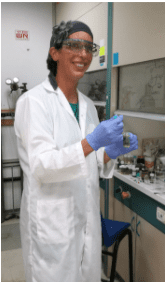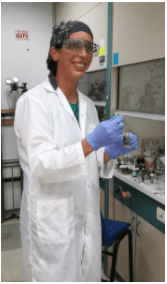
Scientific Journal Caves to Anti-Israel Academics Claiming Biblical City Not Part of Israel
An article on recent advances in organic fluorophores was about to be published in January 2021 in a special edition of Molecules, a peer-reviewed open access scientific journal that focuses on all aspects of chemistry and materials science. Dr. Mindy Levine, a professor in the Department of Chemical Sciences at Ariel University, was to be the guest editor of the special edition titled “Advances in Organic Fluorophores: Design, Synthesis, and Applications.”
Anti-Israel Academics
Under the auspices of the “Palestinian No Academic Business as Usual with Ariel University” initiative, a group led by Prof. George Smith, winner of the 2018 Nobel Prize in Chemistry, and Prof. Malcolm Levitt, a Fellow of the Royal Society, complained to the journal, demanding that the description of Ariel University be changed to Ariel University, the illegal Israeli settlement of Ariel, Occupied Palestinian Territory.”

Dr. Mindy Levine (courtesy: Ariel University)
In a letter to the journal, the group made the following claims:
“Ariel University is an illegal institution that is deeply and directly complicit in Israel’s system of oppression that has denied Palestinians their basic rights guaranteed by international law, including the right to education and academic freedom.”
The journal requested that Dr. Levine make the change, removing the word ‘Israel’ from the description, but she refused. In response, Molecules canceled the publication of the special edition and removed it from its website.
Prof. George P. Smith, an advisory board member for the anti-Israel group, welcomed the news: “All we asked in the original petition was for Professor Levine to correct the address of her university to comply with international law: Ariel is an Israeli Jewish settlement in Occupied Palestinian Territory, not a town in Israel. Sadly, she has refused, effectively choosing pro-occupation propaganda over her own academic freedom and the larger interest of the global science community in unfettered publication of scientific ideas and results. The editors of Molecules are to be commended for taking the only responsible course of action in the circumstances.” Prof. Malcolm H. Levitt, said: “It is a wise and excellent move by Molecules to request that the guest editor from Ariel University correct her affiliation to one recognized under international law, and to discontinue the Special Issue when she refused to do so. Hopefully, many other academic journals will follow suit.”
Anti-Israel=Anti-Science
In an interview with JPost about the incident, Prof. Eugene Kontorovich, Director of International Law at the Jerusalem-based Kohelet Policy Forum, criticized the journal as well as the anti-Israel group.
“Molecules has put politics over science,” Prof. Kontorovich said. “It requires all authors to provide a mailing address; whatever one thinks of the politics, ‘Ariel, Israel’ is indeed the correct mailing address, as one can discover by sending a letter. The purpose of a contact address – to allow communication with the author – has been turned into a geopolitical judgment by chemists unqualified to make it.”
“Papers from authors in other contested areas have been published without any insistence on any ‘legally correct’ description,” he continued. “Now Molecules must revise its policies for several territories, or stick with a Jewish-only double standard.”
It should be noted that there are currently several hundred Arab students enrolled at Ariel University. Ironically, in an article in YNet in 2010, many of the Arab students at the university were concerned that these efforts by anti-Israel groups would result in their degrees not being recognized outside of Israel or their work being censored.
Israel Academia Monitor, an online website advocating for academic freedom, was critical of the journal’s decision:
“Professors Smith and Levitt, and the academics who support BDS are not helping the Palestinians. They could be more productive if they spoke out against the brutal treatment the Palestinians receive from their own authorities.
“The BDS campaign made significant inroads in the social sciences, but it is a relatively rare occurrence in the natural science journals which try to stay away from politics. This is a regrettable incident, and the editors of Molecules should reinstate the special issue of the journal. By succumbing to the BDS crowd, the journal has deprived its readers of knowledge that could benefit the field.
Facts: Top-Notch Professor at Top-Notch University
Dr. Levine completed her Ph.D. from Columbia University before completing a postdoctoral fellowship at MIT. She joined Ariel University in 2019 as a supramolecular chemist, working on the development of practical chemical sensors for environmental and medical detection applications.
She has published more than 60 peer-reviewed publications that have been cited more than 1100 times, has two provisional patents filed, and has presented her research over 200 times. She is an editorial board member of the journal Supramolecular Chemistry, and is currently guest-editing an issue in the Israel Journal of Chemistry.
Ariel University is a regional branch of Bar-Ilan University established in 1982 located in the city of Ariel in Samaria. The university cooperates with international organizations and universities all over the world and is a member of the International Association of Universities. The university and its staff have been the target of boycotts, both in Israel and overseas, for its location.
Ariel literally means ‘Lion of God’. “Ari” (Lion) in Hebrew is also a synonym for bravery and courage and it is also the symbol of the tribe of Judah. The city of Ariel is named after Jerusalem. Ariel in the Bible is one of the names for Jerusalem and the Temple of Jerusalem (Isaiah 29:1–8).
Israel in the News